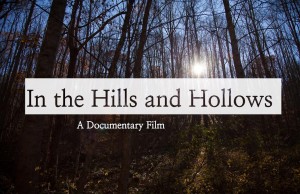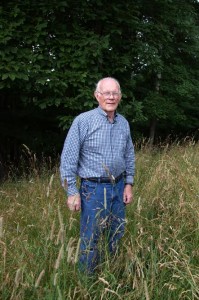{ Editor’s Note } Filmmaker Keely Kernan, who wrote this piece, is currently producing In the Hills and Hollows, a documentary that follows the lives of several West Virginia residents living in the middle of the natural gas boom. The film also juxtaposes the boom and bust coal industry that has dominated the landscape of West Virginia for over a century with the current natural gas boom. Visit hillshollowsdoc.com to learn more about the project. Read the latest issue of The Appalachian Voice, which features stories about our fractured relationship with natural gas.

In the Hills and Hollows is an upcoming documentary film by Keely Kernan about the natural gas industry and its impacts on West Virginia communities.
It was on the banks of the Ohio River that I was reunited with former residents of Tyler County, W.Va., Annie and John Seay. They were staying in an RV park that had become home to more than a dozen transient oil and gas workers.
I first met Annie and John at their home in Lima, W.Va., that was situated up a hollow surrounded by the vast rolling mountains that encapsulate West Virginia. They moved here from California with the hope of living off the land and retiring in the quiet countryside. After spending years investing in their property and building their dream home they found themselves doing the unimaginable — packing up and leaving West Virginia. Their property had been surrounded by dozens of gas wells and the smell of gas lingered in their hollow. There was no end in sight to the natural gas development that was transforming the rural landscape into an industrial zone.
“There is no respect for rural areas and rural areas are the ones getting attacked,” says Annie. After years coping with all the development, the traffic, and the insecurity of the long term consequences associated with living next to dozens of gas wells they decided it was time to leave. They left their home in August 2014 and moved into an RV. What they hadn’t sold at auction was packed up and placed in a storage facility until the time they found their new home.
As I walked towards their RV a large barge of coal slowly drifted down the Ohio River. It had been a few months since the last time I saw Annie and John. The weight of what had just happened and the unknown destination ahead of them was still heavy on their minds. However, their hope remained clear: find a new home, ideally somewhere this could never happen again.
In recent years, West Virginia has had some of the highest rates of depopulation in the country. Many reasons have added to this such as the lack of employment opportunities and the mechanization and decline of the coal industry. After the Elk River chemical spill last January, dozens of for “For Sale” signs started popping up around Charleston. And now the natural gas boom has hastened the population drain.
On my journey throughout the state I have met dozens of residents facing the same reality as Annie and John. These residents’ stories bring to the surface larger issues that need to be addressed in our country today — mineral rights versus individual surface rights, eminent domain versus individual and community rights. Overall, these stories provoke the question — what do property rights really mean?
As Lewis County resident Tom Bond states, “I would be forced to contribute the value of my property to a private enterprise. It is basically unconstitutional.” Bond is an 83-year-old cattle farmer from Lewis County and, like many residents of West Virginia, he does not own the minerals under the surface of his property.
Citizens across the nation are facing these challenges as natural gas development moves into their communities. What makes West Virginia unique is that in many ways this is history repeating itself. We have seen the legacy of the boom and bust coal industry, the poisoning of our waterways and the endless boarded up houses and empty store fronts that line the streets of towns that were once prosperous. In the southern part of the state the counties that produced the most coal are some of the poorest in the United States. We have seen wealth and resources leave and know what it is like to be left behind.
As I sat on the banks of the Ohio River and watched more coal barges flowing past I thought about the direction we are heading in yet again as a state. I have always believed in storytelling, particularly visual storytelling. I think it has the potential to connect us to people and places we might not otherwise know or understand. I hope that by sharing these stories I can help promote an important conversation about the type of future we want to share.
Watch the trailer for In the Hills and Hollows and learn more about the project here.




I grew up in Pike County, Kentucky, closer to Virginia than the town of Pikeville. I watched the devastation of the river, wildlife, and mountains. Sometimes when driving through the area, it looks like an alien planet with the kudzu growing wild and choking everything. This was the corporate answer to reclamation. There are no words that can truly describe what mountaintop removal has done to Appalachia. John Grisham tried in “Gray Mountain” but didn’t quite succeed. There’s no turning back time. What’s lost cannot be recovered. I just wish we would learn from our mistake instead of repeating them in the never-ending chase of the almighty dollar.
History repeats itself, and it is always written by those motivated by greed. I am a recently retired son of West Virginia who has returned to the mountains to live out the rest of my life on 90 acres I purchased 14 years ago in Pence Springs. The month I retired was the month I found out about a proposed natural gas pipeline running through the middle of my property. Over a hundred years ago my great grandfather sold 1,000 acres for $1,000 in Boone Co. and millions were made for the coal and gas operators who purchased it. The sad history of the coal fields is now going to be repeated by natural gas pipelines running the length and breadth of our beautiful, unique, and fragile state. Our politicians seem oblivious to how special the environment of West Virginia is and the irreparable damage these pipelines will cause. A man cannot even rely on private property rights to protect his plans and his dreams under threat of eminent domain. Few jobs will be created for West Virginians, no gas will be used by our residents, and our state will suffer new environmental scars for private profit motive. It is long overdue for some enlightened leadership in this state.
Thanks for your comments, Robert – it’s with dismay that we’ve been hearing many such stories recently, each reflecting the sudden shock that communities stand to be impacted by dirty gas transmission projects that seem to disregard homes, ecology, and the consequences for the global atmosphere. As we work to support the resistance against these proposals I hope you’ll continue providing us with input and helping us get the word out there.